Book contents
- Frontmatter
- Contents
- Acknowledgments
- Introduction: German Thought since Kant
- 1 Immanuel Kant (1724–1804)
- 2 Georg Wilhelm Friedrich Hegel (1770–1831)
- 3 Ludwig Feuerbach (1804–72)
- 4 Arthur Schopenhauer (1788–1860)
- 5 Karl Marx (1818–83)
- 6 Friedrich Nietzsche (1844–1900)
- 7 Sigmund Freud (1856–1939)
- 8 Martin Heidegger (1889–1976)
- 9 Walter Benjamin (1892–1940)
- 10 Georg Lukács (1885–1971)
- 11 Max Horkheimer (1895–1973) and Theodor W. Adorno (1903–69)
- 12 Jürgen Habermas (b. 1929)
- Index
- About the Editors
2 - Georg Wilhelm Friedrich Hegel (1770–1831)
Published online by Cambridge University Press: 05 September 2014
- Frontmatter
- Contents
- Acknowledgments
- Introduction: German Thought since Kant
- 1 Immanuel Kant (1724–1804)
- 2 Georg Wilhelm Friedrich Hegel (1770–1831)
- 3 Ludwig Feuerbach (1804–72)
- 4 Arthur Schopenhauer (1788–1860)
- 5 Karl Marx (1818–83)
- 6 Friedrich Nietzsche (1844–1900)
- 7 Sigmund Freud (1856–1939)
- 8 Martin Heidegger (1889–1976)
- 9 Walter Benjamin (1892–1940)
- 10 Georg Lukács (1885–1971)
- 11 Max Horkheimer (1895–1973) and Theodor W. Adorno (1903–69)
- 12 Jürgen Habermas (b. 1929)
- Index
- About the Editors
Summary
Life and Work
Born in Stuttgart in 1770, Georg Wilhelm Friedrich Hegel studied theology and philosophy at the Tübinger Stift, the theological seminary attached to the University of Tübingen. Here, he formed friendships with two students who would also become major figures in German cultural history, the poet Friedrich Hölderlin and the philosopher F. W. J. Schelling. He graduated in 1793. Not wanting to become a vicar, he started working as a private tutor, first in Bern (where he became acquainted with the work of the economists James Steuart and Adam Smith, whose ideas would remain crucial to his thinking) and after that in Frankfurt. When his father died in 1799, Hegel came into a little money, which allowed him to pursue an academic career. With Schelling's help, he was appointed Lecturer and then Professor of Philosophy at the University of Jena; both jobs were badly paid, as Hegel was remunerated by students’ fees only. In 1806, he completed the Phänomenologie des Geistes, the first extensive exposition of his own philosophical ideas. (Before that, he had published several other, less independent and less accomplished texts, and had also written a substantial number of manuscripts and lecture notes.) When Napoleon's forces occupied the city following the Battle of Jena, Hegel was obliged to look for gainful employment elsewhere and, after a stint as a newspaper editor in Bamberg, became head of a secondary school in Nuremberg. During his time there, he got married (he already had an illegitimate son by his former landlady in Jena). He also published the two-volume Wissenschaft der Logik, a treatment of the most fundamental concepts of his thought and one of the most difficult philosophical texts ever written.
- Type
- Chapter
- Information
- Modern German Thought from Kant to HabermasAn Annotated German-Language Reader, pp. 57 - 80Publisher: Boydell & BrewerPrint publication year: 2012



